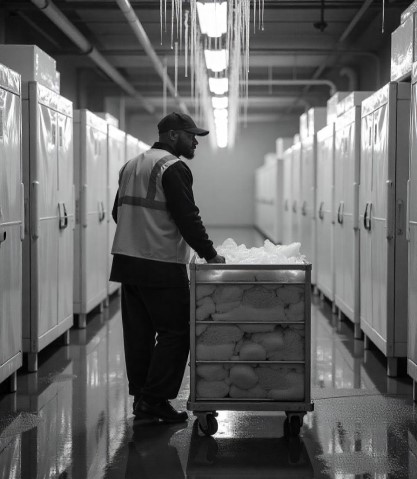5 Immigrants tell us the Types of Jobs You Should Avoid Abroad (USA, UK or Canada)
In today’s globalized market, working abroad is a terrific approach to achieving professional advancement. It offers a golden opportunity for us to earn excellent wages abroad and provide for our family at home, which are available to overseas workers. The money covers household expenses, children’s educational costs, electricity bills, and other expenses.
However, you can’t just sit back and accept any kind of job you find abroad. This is because some jobs will leave you regretting why you embarked on the journey abroad. These jobs offer huge challenges and life-threatening risks that the average person should not try to deal with.
Thus, in this post, I will show you 5 types of jobs you Should avoid abroad. These jobs are the ones you should steer clear of.
#1. Working in a cold room/storage:
The risks associated with working in freezers and cold rooms are high. These dangers provide a significant risk of death or severe injury.

What Are the Risks of Working in Cold Storage?
Only a certain range of temperatures is acceptable to human bodies. Extreme temperatures, whether high or low, pose a major risk to human health. Anyone who works in cold storage is aware of how unbearable sub-zero temperatures may be if proper protection isn’t taken or if one stays in such an atmosphere for an extended period of time. Apart from low temperatures, there are various other concerns associated with working in cold and damp situations. Among them are:
- Exposure to cold (hypothermia)
- Entrapment
- Lack of oxygen
- Slips, trips, and falls
- Lack of visibility
Furthermore, continuous exposure to cold in an industrial work setting can have a wide range of detrimental impacts. The most obvious ones are discomfort, a feeling of numbness in the hands, feet, cheeks, nose, and ears, as well as poor physical and manual development of the tasks performed.
Thus, the most dangerous outcome would be hypothermia, which is the overall cooling of the body due to a loss of body heat and can, in severe situations, result in death and frostbite of the limbs.
#2. Working in Chemical production companies
The chemical industry contributes to the transformation of raw materials into the products we use daily. A few industries that directly depend on the chemical sector are agriculture, the food industry, pharmaceuticals, and hygiene products. Chemical processes are continuously enhanced by technological innovation, which raises their efficiency in terms of energy usage, duration, and waste minimization.
Therefore, errors and mishaps can occur with disastrous results for the environment and the workers at chemical facilities. The following are a few of the most dangerous:
1. Failure of the production system
There is the possibility of production system failure accidents, whether caused by human mistakes or malfunctioning technical equipment, and those can lead to potential health issues or loss of life when these chemicals are exposed to the air and enter the lungs.
2. Natural disasters
Natural disasters can pose a threat to chemical facilities based on their specific geographic location. For example, a chemical plant may be seriously jeopardized by earthquakes and floods. They may result in explosions, the release of hazardous chemicals, and other disastrous occurrences.
3. Poor waste management systems
Many chemical factories produce hazardous waste that needs to be managed properly as a result of their manufacturing operations. When there is a poor waste management system, workers may be exposed to this dangerous waste that can affect their lives in the long run.
#3. Faced-paced industries:
Let’s look at what Maria Fernanda Mejia on Quora has to say about this:
“I was working 10 hours a day in a call center agent position (customer service). Every 2 minutes I received a call. I learned the meaning of time during that job. Angry customers, followed by slow ones, followed by impatient customers. I had one hour of lunch and two 15-minute breaks. This would amount to approximately between 7 and 8 hours of calls a day! Needless to say, it was the most stressful work situation I have encountered. I’m not proud of this, but by month six of working there, I started hanging up calls and not caring about my performance at all. I realized early on that I’d rather quit than affect the company in any way. So I did.…Also, I took everything they said to heart, so I was emotionally drained, left with little to no self-esteem, and I was not getting paid good money. The reason I stayed for so long was the people around me and financial “independence.”.
While working in these conditions, employees must continually make snap judgments and work against the clock; they may cause extreme anxiety and burnout. When speed takes precedence above accuracy, quality may suffer.
Furthermore, it can lead to health problems, including anxiety and sleep disturbances. Also, you may start experiencing relationship problems, and a decline in job satisfaction might arise from an unbalanced professional and personal life.
#4. Dishwashing jobs:
Cleaning dishes is not as simple as it seems. Washing dishes may sometimes be a difficult and thankless chore. For people who may be looking for a dishwasher job abroad, note that it has its cons and requires making numerous sacrifices.

1. You spend Long hours on the job
The average dishwasher works long hours. The majority of shifts last 12 hours, occasionally lasting till midnight. The majority of the summer and holiday hours are spent at the dish pit because restaurants require their dishwashers over the summer and during important events. It’s common to expect dishwashers to arrive at all times to maintain restaurant service. You could therefore have to work on your day off.
2. You might get paid little.
Some eateries don’t value the labor-intensive work that dishwashers do. They think that dishwashers ought to be paid less than a livable wage. Unfortunately, working as a dishwasher can be difficult due to the combination of long hours and little compensation.
3. You work in a Smelly environment
A dishwasher may smell like a variety of various foods mingling together or from food that has gone bad, depending on the standards set in the kitchen. Food may occasionally fall on you as well, leaving you with an unpleasant food odor.
4. You will get soaking wet.
You could get completely soaked by water bouncing off plates. Dishwashers that are constantly moist can also be caused by immersing plates in water and tangling the hose. Moreover, leaving your hands in water for four hours straight can aggravate them.
5. It is a tiring job.
Workers may experience burnout as a result of the strain and long hours spent in the kitchen. Dishwashers must stand on their feet for extended periods, lift large products, and deal with sharp objects.
#5. Night shift jobs
Working night shifts are said to interfere with alertness and performance because it disrupts your normal life and causes sleep loss. Working night shifts has detrimental effects on both the worker and those impacted by the service being provided; this includes considerable financial and productivity losses as well as detrimental effects on patient safety and care.

Let’s now examine the impact of night shifts:
1. How Night Shifts Affect Sleep
The most evident impact of night shift work is on sleep, where it has an impact on both quantity and quality of sleep. Therefore, those who work nights typically get two to four hours less sleep due to early wake-up calls.
Those who work night shifts in the future are more likely to suffer from sleep deprivation, and this increases the chance of mistakes and mishaps.
2. Night Shift Work’s Impact on Mental and Psychological Health
Night shift workers experience chronic weariness, neuroticism, chronic anxiety, depression, and mood disorders as a result of the ongoing disruption of their circadian cycle and the increasing lack of sleep that this causes. In addition, there was an increase in absenteeism among night shift workers, and you may need to be treated with psychiatric medications, including sedatives.
3. Nightshift Work’s Impact on Cancer and the Cardiovascular System
Studies indicate that working night shifts is strongly linked to the development of cardiovascular problems; shift workers are 40% more likely than modern workers to acquire ischemic heart disease on average. Furthermore, as a shift worker, you may be prone to suffer from lifestyle practices including smoking, obesity, and high total cholesterol, which are significant cardiovascular risk factors.
In summary
The aforementioned points suggest that if you want to avoid making a significant error in your job hunt, do your homework and exercise critical thinking. I recommend that you learn a digital skill, as this will give you an advantage of getting high-paying jobs abroad that will give you peace of mind and high pay. When applying for a job overseas, be prepared so that you can safeguard yourself against unforeseen vices.
Read Also: 10 Hard Skills That Will Land You More Career Opportunities Than Most People Today









